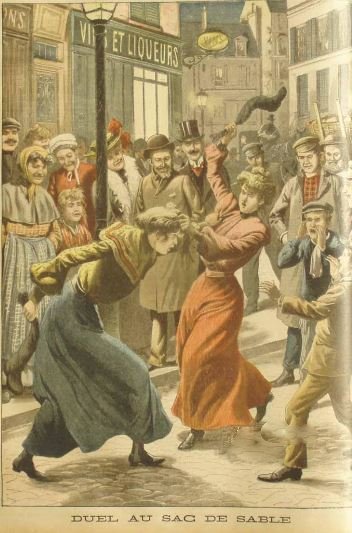In A Tramp Abroad, published in 1880, Mark Twain mocked the French practice of dueling:
“Much as the modern French duel is ridiculed by certain smart people, it is in reality one of the most dangerous institutions of our day. Since it is always fought in the open air, the combatants are nearly sure to catch cold. M. Paul de Cassagnac, the most inveterate of the French duelists, had suffered so often in this way that he is at last a confirmed invalid; and the best physician in Paris has expressed the opinion that if he goes on dueling for fifteen or twenty years more—unless he forms the habit of fighting in a comfortable room where damps and droughts cannot intrude—he will eventually endanger his life.”
Paul de Cassagnac, who fought twenty-two duels, will be mentioned again in this post and in the embedded video you will be able to see his son follow the family’s dueling tradition.
Whatever Mark Twain might have said with his customary sarcasm, the duel was no laughing matter. In the Middle Ages, it was a legitimate procedure to settle a personal dispute. Yet as time went by, an excess of testosterone combined with personal pride made it the prime cause of death among young nobles, who felt obliged to fight for the slightest personal offense. At the rate of 500 deaths a year, France was in danger of losing all of her nobility to trivial disputes. Duels were outlawed by a royal edict. However, the social pressure remained strong and the image of a hero executing a mortal dance to avenge an insult had an irresistible pull. From public places, the duels merely moved to private enclosures or to forest clearings.
After the 1789 revolution, all the royal edicts were abolished including those banning duels. All citizens were allowed to carry arms which led to the democratization of the duel: now men of all classes could kill each other just as stupidly as the nobles had done for centuries. Fortunately, most of the duels fought in this period ended with the first appearance of blood. A mere scratch was often good enough to satisfy the offended honor. Even so, 200 deaths in duels were registered between 1826 and 1834.
 Although in the 19th century a duel kill could be punished as a murder, the authorities were generally indulgent if the result was a mere injury. For instance, in 1868, Paul de Cassagnac was condemned by the Sixth Chamber of the Criminal Court of the Seine to six days in jail and 200 francs fine after his victorious duel with his cousin Prosper-Olivier Lissagaray. The four witnesses were sentenced to 50 francs fine each. The victim was let off to lick his wounds. (Lissagaray was put to bed for a month. Barely recovered, he sent his witnesses to Cassagnac to continue the duel. Cassagnac replied: “No, sir. I left you on the ground riddled like a sieve. I could consent to be your opponent, it disgusts me to become your butcher.”)
Although in the 19th century a duel kill could be punished as a murder, the authorities were generally indulgent if the result was a mere injury. For instance, in 1868, Paul de Cassagnac was condemned by the Sixth Chamber of the Criminal Court of the Seine to six days in jail and 200 francs fine after his victorious duel with his cousin Prosper-Olivier Lissagaray. The four witnesses were sentenced to 50 francs fine each. The victim was let off to lick his wounds. (Lissagaray was put to bed for a month. Barely recovered, he sent his witnesses to Cassagnac to continue the duel. Cassagnac replied: “No, sir. I left you on the ground riddled like a sieve. I could consent to be your opponent, it disgusts me to become your butcher.”)
Now we have heard enough about Paul de Cassagnac to be curious. Who was this duelist extraordinaire? A French Casanova? Most would think that duels were fought mainly over a lady’s honor, especially in France, but that would be a mistake. Journalists and politicians were called out more often than wife’s lovers. De Cassagnac, both a journalist and a deputy at the National Assembly, made numerous enemies with his radical views. His son, Paul de Cassagnac Jr., inherited both his father’s dangerous occupations and his fiery temperament. You can see him fighting in the following video clip (second duel).
By the beginning of the 20th century, the duel was a thing of the past in all countries except in France, where it was still going strong until the killing fields of WWI took away the lives of an entire generation. There were a few duels afterward, all duly caught on film, but one would believe that even the French would be entirely done with dueling after the horrors of WWII. Right?
Wrong! The last duel in Paris was fought in April 1967. Again, the point of contention was not an affair of the heart fought over by two young bucks. The participants were two staid politicians in the French hotbed of disagreement: the National Assembly. Deferre, the mayor of Marseille, was constantly interrupted in his speech by the deputy of Val d’Oise, René Ribière. “Mais taissez-vous donc, abruti!” (Shut up, you half-wit!), shouted Deferre. Refusing to apologize for the insult, he was challenged to a duel. President Charles de Gaulle sent emissaries to cancel the duel, but without success. The participants avoided the police and organized a secret encounter on a private property. The duel lasted four minutes and the referee put an end to it after the second scratch. Just as well because Ribière, the loser, was getting married the next day. And so, after all the politics, we can finally mention l’amour.
Related post:
Events in the Street: Female duel with sand-filled socks
.
If you enjoy these posts, support the author by buying her books on Amazon:











